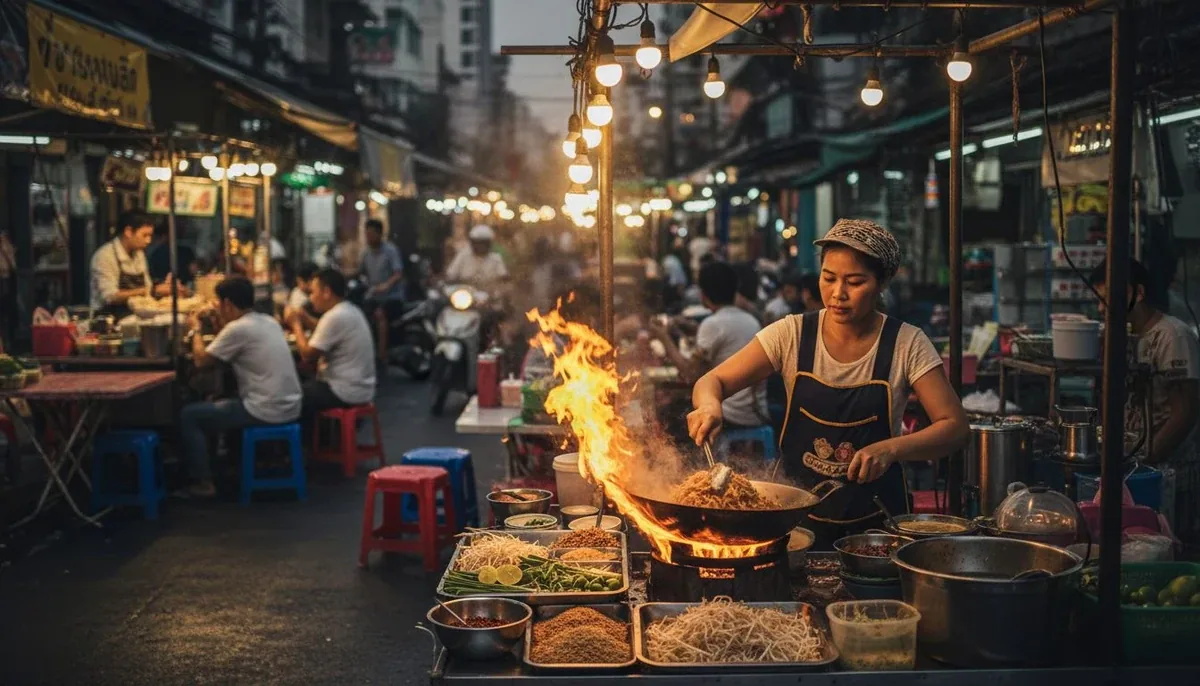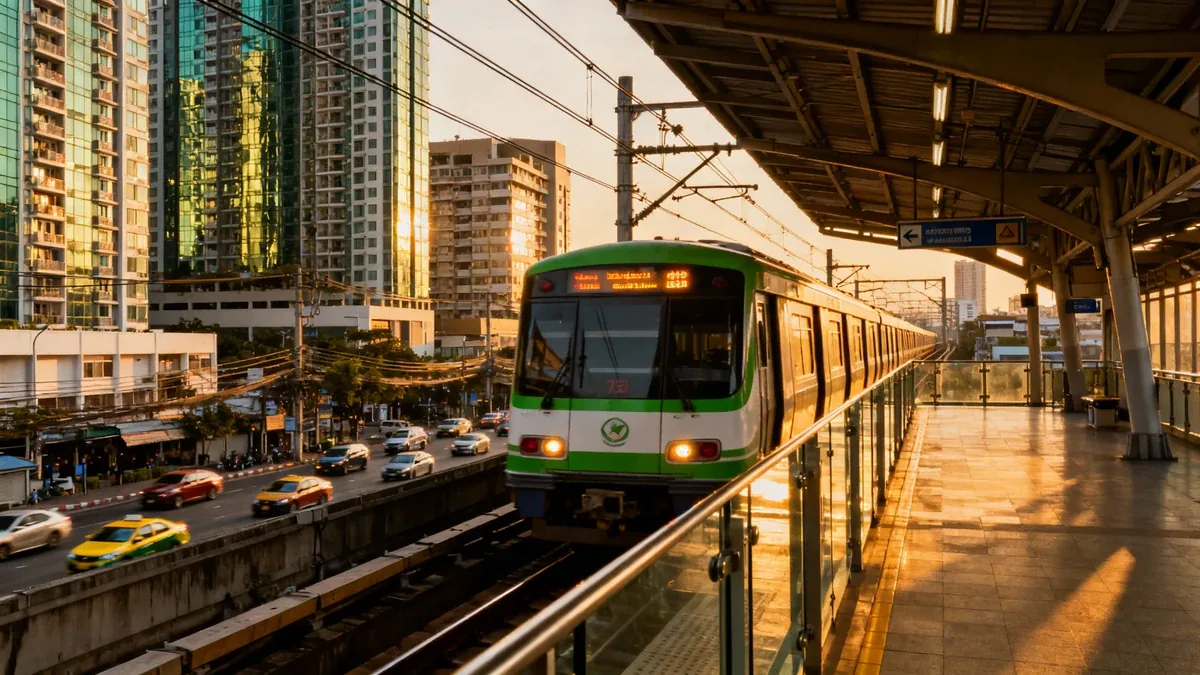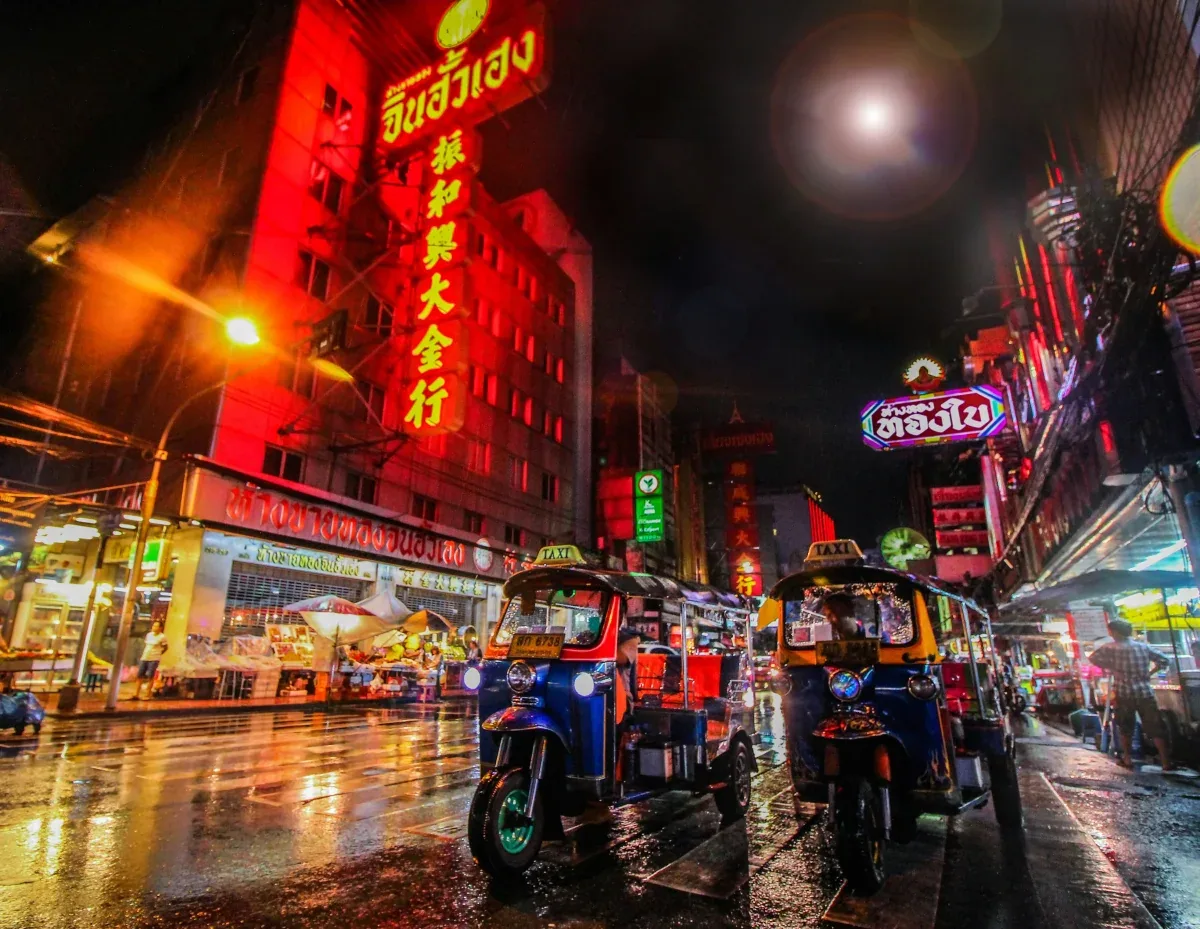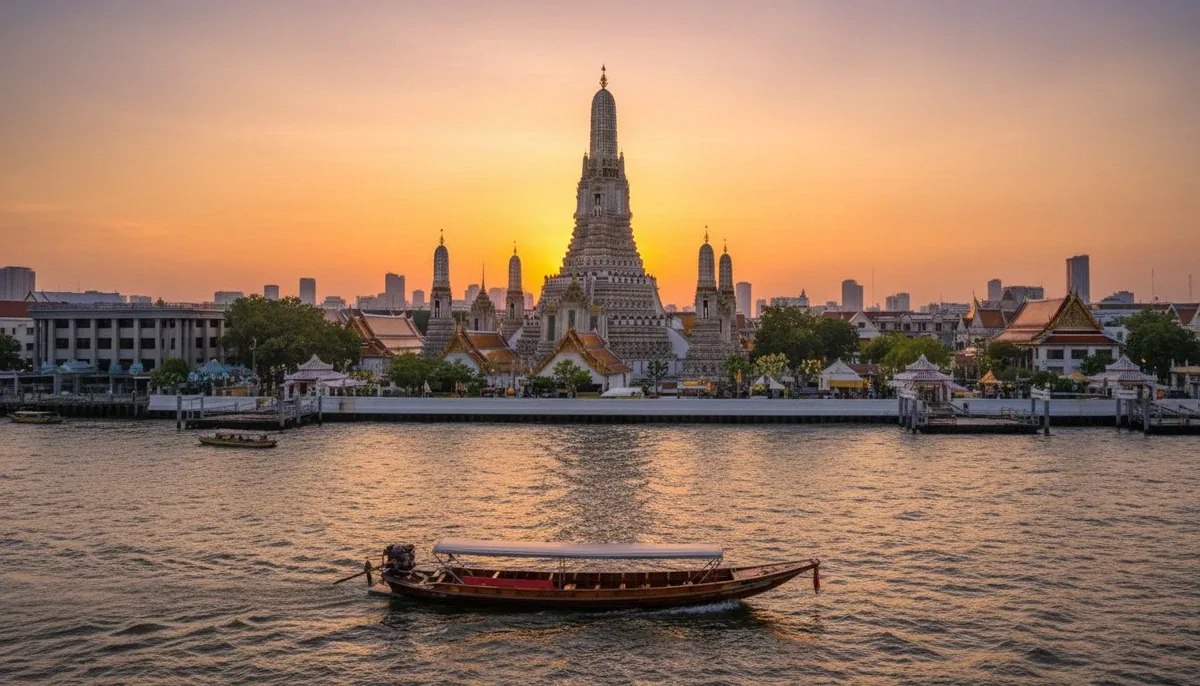
🏙️Bangkok
Thailand's bustling capital city

Thailand's bustling capital city
Step out of your Suvarnabhumi Airport arrival gate at midnight on a Wednesday, and Bangkok greets you with the energy of midday. Taxi ranks buzz with activity, food vendors serve steaming noodles, and the elevated expressway glows with an unbroken river of red taillights. This is Thailand's capital—a city of 10.7 million souls that pulses with an intensity that either thrills or exhausts you, often both in the same day.
I've watched Bangkok transform countless newcomers. They arrive expecting temples and tuk-tuks, and yes, those exist. But Bangkok is fundamentally a megacity—Southeast Asia's second-largest urban economy, a place where luxury malls cast shadows over street food vendors, where monks scroll smartphones on the BTS Skytrain, where you can eat Michelin-starred meals or exceptional pad thai for 40 baht. For expats, Bangkok offers something rare: genuine career opportunities combined with a cost of living that makes ambition affordable.
What surprised me most about Bangkok wasn't the famous traffic or the heat—those you expect. It was discovering that despite its size and chaos, Bangkok works. The infrastructure functions. Healthcare rivals anywhere in the world. The food scene is legitimately world-class. And the expat community, numbering over 300,000, means you're never truly starting from scratch when you arrive.
"Bangkok offers something rare: genuine career opportunities combined with a cost of living that makes ambition affordable."
Let's be direct: most people don't move to Bangkok for the quiet life or clean air. They move here because Bangkok is where things happen in Thailand. It's where the jobs are—international companies, tech startups, teaching positions, hospitality management, digital marketing agencies. If you're building a career in Southeast Asia, Bangkok puts you in the room where decisions get made.
The job market spans industries. Tech companies cluster around co-working spaces in Asoke and Phrom Phong. International schools across the city employ hundreds of foreign teachers. Hotels and restaurants perpetually seek management with Western experience. English teaching remains a reliable entry point, though the days of high pay for minimal qualifications have passed—Bangkok now expects credentials and experience.
But Bangkok's appeal extends beyond work. The city offers infrastructure that much of Thailand lacks. World-class hospitals like Bumrungrad and Samitivej attract medical tourists globally—these aren't just "good for Asia" facilities; they're genuinely excellent healthcare providers where English-speaking doctors trained internationally provide care at a fraction of Western costs. The BTS and MRT make car-free living viable. Supermarkets stock imported goods. International schools provide quality education. These conveniences matter when you're building a life, not just passing through.
Bangkok sprawls across 1,500 square kilometers, but expat life concentrates in distinct pockets along the BTS and MRT lines. Your neighborhood choice shapes your entire Bangkok experience more than any other decision. Choose wisely, because while the city offers incredible convenience, getting anywhere in this city requires strategic thinking about location.
Sukhumvit is where most expats start and many never leave. Running along the BTS Sukhumvit Line from Nana to On Nut, this corridor offers everything within walking distance: international restaurants, Western supermarkets, co-working spaces, gyms, and endless condos. It's convenient but can feel sanitized—you're in Bangkok but insulated from it. Expect to pay 15,000-40,000 THB monthly for a studio or one-bedroom condo, more if you want a recent building with a decent pool.
Thonglor and Ekkamai (Sukhumvit's upscale eastern stretch) attract established expats and affluent Thais. The vibe shifts from transient to residential—families with kids at international schools, restaurants that focus on quality over novelty, streets that actually quiet down after midnight. You pay premium for this polish: 25,000-60,000 THB for apartments, often more for houses with yards. But if you have kids or crave stability, Thonglor delivers.
Silom and Sathorn make sense if you work in finance or corporate sectors. Bangkok's business district means modern high-rises, suits at lunch, and condos designed for professionals. It's efficient and slightly soulless—perfect if your life centers on career. Rents run 18,000-50,000 THB depending on building age and BTS proximity. The area clears out on weekends as residents flee to more vibrant neighborhoods.
Ari and Phahonyothin offer a glimpse of Bangkok before full expat colonization. These neighborhoods north of central Bangkok maintain Thai character while accommodating foreigners who don't need every sign in English. Tree-lined streets, local markets alongside hipster cafes, and rents 20-30% below Sukhumvit (12,000-30,000 THB). The tradeoff? Fewer Western amenities and occasional communication challenges. But if you moved to Thailand to experience Thailand, Ari makes sense.
Live near a BTS or MRT station—ideally within 500 meters walking distance. Bangkok's traffic makes even short car journeys lengthy ordeals. Proximity to trains isn't just convenient; it fundamentally changes your relationship with the city. You can actually say yes to evening plans without dreading the journey.
Before signing a lease, walk the neighborhood at different times. That quiet street at 2 PM might roar with traffic at 8 AM. That convenient location beside the train station might mean perpetual construction noise. Bangkok rewards reconnaissance. For more on navigating housing search strategies, check our comprehensive guides.


Bangkok's cost of living exists on a sliding scale. You can live extremely cheaply—30,000 THB monthly if you eat local food, take public transport, and embrace modest housing. You can spend lavishly—100,000+ THB on luxury condos, imported groceries, and taxi-everywhere convenience. Most expats land somewhere in the middle, around 50,000-80,000 THB monthly for comfortable living without constant budget consciousness.
Housing consumes the largest chunk of your budget. A decent one-bedroom condo in a central location with modern amenities runs 15,000-25,000 THB. Add utilities—electricity (crucial for air conditioning) averages 2,000-4,000 THB depending on usage, internet costs 600-1,000 THB, water stays minimal around 100-200 THB. That's 18,000-30,000 THB before you've eaten a meal or left the apartment.
Mid-range comfortable lifestyle for single person
Food costs vary wildly based on your choices. Eat like locals—street food, food courts, Thai restaurants—and you'll spend 150-300 THB daily (4,500-9,000 THB monthly). Mix in Western restaurants, imported groceries, and weekend brunches, and that easily doubles to 15,000-20,000 THB monthly. Bangkok's food scene is its greatest strength and biggest budget temptation. The city never stops offering something delicious just around the corner.
Transportation depends entirely on whether you rely on public transit. A month of BTS/MRT commuting costs 1,500-3,000 THB. Add occasional Grab rides (Bangkok's Uber equivalent) for convenience or late nights, and you're looking at 4,000-5,000 THB total. Own a car? Factor in fuel, parking, tolls, insurance, and the hidden cost of sitting in traffic—suddenly public transport looks brilliant despite the crowding.
Bangkok sits 14 degrees north of the equator, and you feel every one of them. The city operates on three seasons: hot (March-June when temperatures hit 35-40°C), rainy (July-October with afternoon downpours), and cool (November-February when it "drops" to 25-30°C). That cool season is Bangkok's glory—comfortable enough for walking, pleasant enough for outdoor dining, the perfect window for exploring a city that punishes outdoor activity most of the year.
The heat isn't just uncomfortable; it shapes everything. You time errands for air-conditioned malls. You strategize routes to minimize outdoor exposure. You understand why every building, vehicle, and residence runs AC constantly, and why your electricity bill spikes. The rainy season brings relief but also flooding in low-lying areas—choose your neighborhood with elevation in mind. Bangkok's drainage has improved dramatically, but heavy rains still overwhelm certain streets.
Air quality adds another layer of challenge. Bangkok's PM2.5 levels spike during dry season (December-March) as pollution from traffic, construction, and agricultural burning settles over the city. You'll see residents wearing masks, air purifiers selling out, and foreigners questioning their choices. It's not Hong Kong or Delhi levels, but it's noticeable and concerning if you have respiratory sensitivities or children. This is Bangkok's least discussed but most persistent quality of life issue.

Bangkok's traffic is legendary for good reason. The city consistently ranks among the world's most congested, and sitting in a taxi watching the meter climb while moving 200 meters in 15 minutes becomes a regular Bangkok experience. This is why the BTS Skytrain and MRT subway aren't just convenient—they're essential to maintaining sanity.
The BTS and MRT cover major corridors reasonably well. Fares run 16-59 THB per journey depending on distance, and trains arrive every 3-5 minutes during peak hours. Yes, they're crowded during rush hour (7-9 AM, 5-7 PM). Yes, the stations can be far apart requiring lengthy walks in heat. But you'll reach your destination on time, which makes the discomfort worthwhile. The Airport Rail Link connects Suvarnabhumi to central Bangkok in 30 minutes for 45 THB—contrast that with taxis that cost 300-500 THB and take 45-90 minutes depending on traffic.
Grab dominates ride-sharing, offering car and motorcycle options. Motorcycle taxis (both Grab and traditional orange-vest riders) weave through traffic and cut journey times dramatically—perfect for short distances when you're running late. They're also thrilling in ways that make you question your life insurance coverage. Cars make sense late at night, during rain, or when trains don't serve your destination. Just accept that a 5-kilometer journey can take 15 minutes or 45 minutes depending on traffic karma.
Should you own a car in Bangkok? Most expats don't. Between purchase costs, insurance, parking fees (scarce and expensive in central areas), and traffic that makes every trip an ordeal, cars make sense primarily for families living in suburbs near international schools. If your life centers on central Bangkok and public transport corridors, you'll save money and stress by staying car-free.
Bangkok hosts one of Southeast Asia's largest expat populations—estimates suggest 300,000+ foreigners call the city home. This critical mass means you're never truly alone in figuring things out. Facebook groups answer every conceivable question. Meetups cater to every interest and nationality. Sports leagues, book clubs, volunteer organizations, business networking events—the infrastructure for community exists if you seek it.
Yet many expats describe feeling isolated in Bangkok despite the crowds. The city's size and intensity can be alienating. Making genuine connections beyond surface-level bar friendships requires effort. The expat community has high turnover—people constantly arrive and leave, making sustained friendships challenging. And while Thais are generally welcoming, language barriers and cultural differences mean most foreigners develop primarily expat social circles, for better or worse.
Co-working spaces like The Hive, AIS D.C., and Hubba serve as de facto community centers for digital nomads and entrepreneurs. International schools create instant parent networks for families. Sports clubs (rugby, football, running groups) provide both fitness and social connection. The key is intentionally building community—Bangkok won't hand it to you, but the city offers abundant opportunities if you show up.
Don't expect Bangkok to feel like home immediately. The city overwhelms at first. Give yourself three months to adjust, six months to establish routines, a year to build genuine community. Those who thrive in Bangkok actively pursue connection rather than waiting for the city to embrace them. Join groups, attend events, say yes to invitations even when you're tired. Community is Bangkok's hidden currency.

Bangkok isn't for everyone, and pretending otherwise does newcomers no favors. The traffic will frustrate you. The pollution will concern you. The heat will exhaust you. The crowds will overwhelm you. There will be days when you question why you chose a city of 10 million in a tropical climate when you could live somewhere temperate and manageable.
But then you'll discover that hole-in-the-wall restaurant serving the best khao soi you've ever tasted for 60 baht. You'll find yourself on a rooftop bar at sunset, the city sprawling golden below you, and understand why people write poems about this place. You'll get genuinely excellent healthcare for a fraction of what you'd pay back home. You'll build friendships across cultures you'd never encounter in a smaller city. You'll pursue career opportunities that wouldn't exist in Chiang Mai or Phuket.
Bangkok demands resilience and adaptation. It rewards those who embrace its intensity rather than fighting it. The city isn't a tropical paradise—it's a megacity with all the complexity that implies. But for expats seeking genuine opportunity, cultural immersion, and life at the heart of Southeast Asia, Bangkok delivers in ways that justify its challenges. Just make sure you can handle the heat, the traffic, and the beautiful chaos that defines Thailand's capital.
Whether Bangkok becomes your home for two years or twenty depends less on the city and more on what you bring to it. Approach it with curiosity, patience, and realistic expectations, and Bangkok offers a life that's simultaneously challenging and rewarding. Rush in expecting easy living or permanent vacation, and you'll likely flee after the first rainy season. This city sorts people quickly—but those who stay often can't imagine living anywhere else.
Population
10.7 MILLION
Average Rent
15,000-35,000 THB
One-bedroom condo
Monthly Budget
50,000-80,000 THB
Comfortable lifestyle
Temperature
25-35°C
Year-round
Expat Population
300,000+
Best For
Career seekers, city lovers, foodies
Quick Take
Bangkok rewards ambition and resilience. Come prepared for traffic, heat, and crowds, but expect incredible food, world-class healthcare, genuine career opportunities, and a community of expats who chose intensity over ease.
Sukhumvit
Central, convenient, international. 15,000-40,000 THB/month
Thonglor/Ekkamai
Upscale, family-friendly. 25,000-60,000 THB/month
Silom/Sathorn
Business district, professional. 18,000-50,000 THB/month
Ari/Phahonyothin
Hip, local flavor. 12,000-30,000 THB/month
Hot Season
March-June · 35-40°C · Intense heat
Rainy Season
July-October · Afternoon downpours
Cool Season
November-February · 25-30°C · Best weather
Air conditioning essential year-round